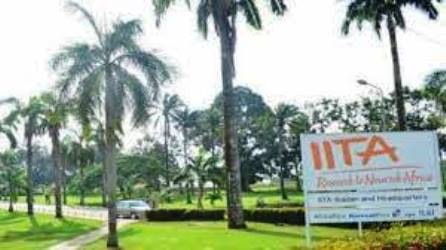The International Institute for Tropical Agriculture (IITA) has pledged to collaborate with the Federal Ministry of Agriculture and Food Security (FMAFS) to enhance soil health and promote sustainable agricultural production in Nigeria.
Dr. Beatrice Aighewi, Head of Station at IITA Abuja, disclosed this in an interview with journalists in Abuja on the sidelines of the launch of the Nigerian Farmers’ Soil Health Scheme (NFSHS).
The NFSHS is a comprehensive soil fertility management programme designed to promote sustainable agricultural practices, improve land productivity, and support climate-smart farming.
According to Aighewi, the initiative will provide farmers with real-time insights into soil conditions, helping them boost yields, reduce costs, and adopt smarter farming practices.
She described IITA as a critical partner of the FMAFS, committed to improving the country’s soil quality.
“Soil health is essential to food production. Whatever you do in agriculture, you must take soil health into consideration,” Aighewi said.
She noted that IITA currently hosts the ECOWAS Centre of Excellence Soil Laboratory in Ibadan, which serves as the Regional Hub for Fertilizer and Soil Health for West Africa and the Sahel.
Aighewi said the collaboration between IITA and the Nigerian government marks a major step toward advancing soil health and agricultural sustainability.
“Our goal at the hub is to ensure that the soils farmers cultivate are healthy. Soil is alive, and maintaining its life is crucial for good yields,” she explained.
“Healthy soil produces better crops, increases farmers’ income, and ensures sustainable livelihoods.”
She urged farmers to take advantage of the NFSHS by visiting soil laboratories and using the information available to improve their productivity.
Similarly, Prof. Vincent Aduramigba, Visiting Scientist at the Regional Hub for Fertilizer and Soil Health for West Africa and the Sahel, said the hub provides technical expertise, innovation, and collaboration to strengthen soil fertility, food security, and resilient agricultural practices.
He explained that the hub is owned by ECOWAS, while IITA provides technical coordination on behalf of member states.
“The hub translates research on soil fertility and agronomy into practical solutions for farmers, empowering them to improve productivity and livelihoods through science and good agronomic practices,” Aduramigba said.
“We are working closely with the Federal Government and the Ministry of Agriculture to ensure improved soil management, agronomy practices, and extension services.”
Aduramigba identified IITA as a strategic partner in the soil health scheme from inception, adding that the Federal Government plans to establish 774 soil health laboratories across the country.
He said the initiative would enable farmers to access soil testing facilities, produce quality crops, and achieve sustainable livelihoods.
Also speaking, Prof. Jubril Mohammed Jubril, President of the Soil Science Society of Nigeria (SSSN), described soil as the foundation of agriculture, stressing that healthy soil is essential for the production of both crops and livestock.
Jubril said the NFSHS would also guide fertilizer companies to produce appropriate blends for different regions in Nigeria.
“Our members are ready to support this initiative, which we have long advocated for. We are pleased that government efforts at various levels are now focused on improving soil health,” he said.


